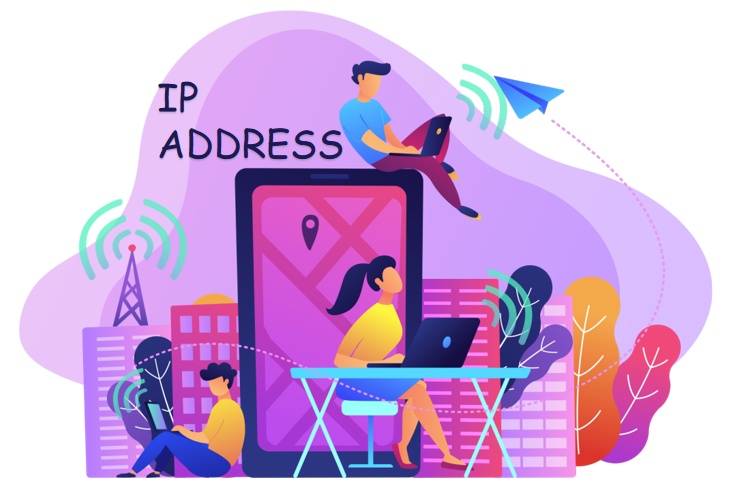Are you curious about the IP address? Can you accept the fact that your IP address is being used by others? Or, do you mind having your IP information accessed by the whole world?
After the Internet became an essential part of every household, the IP address became your virtual address. Your request starts at this address, and the Internet sends you messages back to this address.
So, are you worried about your address being exposed?
If you’re looking for ways to protect your IP address, you probably want to know what’s going on with your IP address so you can figure out the best way to protect it.
In this article, you will learn:
- What is an IP address?
- Why should I protect IP addresses (what happened to your IP address)?
- How can I protect my IP address?
- Is there any browser that can protect my IP address?

What is an IP address?
An IP address represents an Internet protocol address, a unique combination of numbers used to identify routers, computers, or other devices and to allow them to communicate over the Internet. Just as your E-mail address allows others to send an e-mail to you, remote computers need your IP address to communicate with your computer.
The IP address is usually shown as follows: An IP address is a sequence of four numeric blocks. Each of these blocks has a distance between 0 and 255, which means that each block has 256 possible values. This digital IP system allows about 40 unique IP addresses. Looking up someone’s IP address is relatively easy. Site analytics can track site visitors, and sometimes Wiki comment boards use their IP addresses to identify contributors. Your Internet Service provider (ISP) also knows your IP address.
Why need to protect your IP address?
IP theft infringes upon personal rights and interests
IP address theft is a common occurrence in Internet life. If your IP address is stolen by someone else, it can affect your use at best and lead to legal disputes at worst. So it’s important to protect your IP address. Because it protects your use rights and your legal rights.
- Protecting your IP address is protecting your rights of use.
In the era of IPV4, IP addresses are a scarce resource, which gives rise to the practice of IP address theft.
In the IPV6 era, the number of IPV6 addresses has increased a lot, which will not be exhausted according to the current capacity of the earth. However, for some networks that charge traffic by IP address, IP addresses are still scarce, and IP address theft still needs to be prevented. Because if your IP address gets stolen, you can’t get online.
- Protecting your IP address is protecting your legal rights.
Some cybercriminals use your IP address to download pirated goods, such as music and videos, or even child pornography, to protect their real identities from law enforcement.
Yet downloading pirated content is a criminal offense in many countries.
IP leaks threaten personal privacy
IP addresses symbolize positioning. When your phone, tablet, or other device is connected to the Internet, it is associated with an IP address, and these IP addresses often represent a geographical location or range.
Let’s say you use different IP addresses at home, at work, and at the mall, and these locations are your daily routes. Regular use of these three IP addresses over a long period of time will allow the Internet to create a “memory” of you, and this information can be combined to produce a rough guess about your financial ability and movement path.
IP addresses expose trade secrets
How many clients made a deal with you yesterday? What’s your most recent revenue estimate?
Do you think this information is just for you? No! Stealing or attacking IP addresses is a very handy weapon if someone wants to gain it maliciously! It is well known that attacking IP addresses is one of the methods of illegal attacks between countries, but it is also used by companies. There are already many companies that have suffered huge economic losses due to IP attacks.
How to protect your IP address?
Methods to prevent IP theft
1) Disable the network connection service
If users are restricted to modify TCP/IP parameters, they cannot use the new IP address even if they change the IP address, thus losing the meaning of IP theft.
The most direct way to successfully prevent users from changing TCP/IP parameters is to prevent users from opening the TCP/IP parameter setting window. You can do this by disabling the “Network Connections” service on your system and hiding the TCP/IP Settings window so that users cannot access the Settings window and use the new IP address.
Of course, the use of Internet connection service deactivation to protect IP addresses makes normal Internet access difficult. After all, the Internet connection service has been disabled, so any access to the network will be terminated. If you want to protect your IP address without affecting your Internet access, try following the same steps to disable your “Plugandplay” service. This hides the TCP/IP Settings window without affecting your Internet access.
2) Restrict access/modification to the network
If the management rights of common users are directly restricted, they are not allowed to open the TCP/IP parameter setting window, then common users are not allowed to change their IP addresses.
3) Hide the local area connection icon
In general, when changing the COMPUTER IP address, you need to find the local connection icon of the system, right-click the icon, and then run the Properties command in the displayed menu to go to the TCP/IP parameter setting window. There is also no way for ordinary users to open the TCP/IP Settings window and change the IP address if you hide the local connection icon beforehand.
4) Bind the IP address and MAC address
The network card in use there are two types of address, one is familiar with the IP address, the other is the MAC address, that is, the physical address of the network card, also known as the hardware address or link address, which is the only identification of the network card itself, as if it is our identity card, generally can not be changed at will. It has nothing to do with the network, and the MAC address remains the same no matter where the card is connected to the network.
Methods to prevent IP address leak
1) Use a public network
A simple way to protect your IP address is to use the Internet far from where you live. A public network would be a very good choice. That way, even if someone is stalking you, all he gets is a public place and no further attacks.
2) Turn off the router
Turn off your router, restart it, and maybe you’ll get a different IP address!
Note, however, that the different IP address is only selected from the IP address pool in a certain area. Although it is not the same as before, there are still many connections between them.
3) VPN
VPNs are a good way to hide IP addresses.
When you connect a computer (or other devices, such as a smartphone or tablet) to a VPN, all network traffic is sent over a secure connection to the VPN, and the process is all encrypted.
However, VPNs are expensive and can be a burden for individual users with less money. VPNs are better suited to businesses or corporate teams that are financially sound.
4) Proxy
A proxy server is an intermediate server through which traffic can be routed. The Internet server you access sees only the PROXY server’s IP address, not yours. When these servers send information back to you, it goes to the proxy server, which then routes it to you.
5) Use a firewall
Firewalls protect IP addresses from attacks by protecting against Trojan horses and viruses to some extent. A firewall
It can be used to separate the internal network from the external network, and if you are worried about your information security, it is also a good idea to add a trusted firewall.
6) Use a special browser
Some browsers on the market today have powerful protection features, even integrating with proxies to protect your IP address. Such browsers are generally based on the use of virtual technology to protect user privacy.
ClonBrowser
ClonBrowser is a very powerful virtual browser. Whether it is powerful agent integration services or superb anti-fingerprint technology, can protect your privacy!
ClonBrowser supports HTTP, HTTPS, Socks5, ShadowSocks, and other proxy protocols. It also works with leading proxy software (Luminati, 911, etc.) to change your IP address.
ClonBrowser has excellent fingerprint protection, and any website that wants to take your browser’s fingerprint can only get a “mask fingerprint.” Also, ClonBrowser allows you to create and share multiple profiles, manage multiple accounts and work in teams!
Try it for free and protect your IP address!




 Jolian
Jolian November 25,2021
November 25,2021







